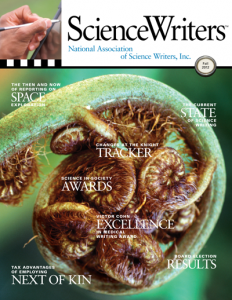By Paul Raeburn
Two years ago, I felt lucky to announce that I had been lured to the Sunshine State by Florida Atlantic University, which offered me a free hand to develop a new master’s program in science writing.
As reported here at the time (SW, Summer 2010), I planned to set up a newsroom where students could get immediate experience writing for the web, so that they would be prepared to move directly into new-media jobs when they finished. I was excited by the prospect of developing a new program from the ground up. How often does an opportunity like that arise?FAU appeared to be establishing itself as a center for research. It was launching a new medical school, and there were two new world-class science institutions on campus — the Max Planck Florida Institute and Scripps Florida. The head of the communications department thought a science-writing program would mesh nicely with that, and I did, too.
Sadly, all has come tumbling down. I spent the first semester writing a 70-page proposal for the program, which was then catapulted into a labyrinth of university committees while I taught a few undergraduate classes. Somewhere, midway through, the proposal stalled, after more than a semester of deliberation.
Part of the reason it disappeared in some committee or other (there were a lot of them) was probably the changes that were occurring at the top of FAU. At first, it seemed that the announced change in administration would be good for the program. The new president — Mary Jane Saunders — is a cell biologist, no less. She appointed a new provost — Brenda Claiborne, a neuroscientist. Clearly, FAU was interested in science, and so was conservative Florida governor Rick Scott who stated he wanted the state’s universities to focus on science and mathematics.
Alas, Gov. Scott was also promising sharp cuts in state funding for universities, and he followed through in the spring of 2012 with $300 million in cuts. As FAU administrators pored over the budget for things to cut, the science-writing program was evidently an easy target.
I have no quibble with that. The president and provost should be able to cut where and when they like. It was the manner in which they did it that I found distressing. Nobody told me the program was on the chopping block. I was not offered a chance to defend it. The dean and the department head who hired me were demoted. They were replaced by administrators with no knowledge of the science-writing program or any interest in it. One came from a background in peace studies, and the other was a pianist.
I found out about the program’s demise when, at a faculty meeting, a budget was distributed that showed elimination of the funding. “I guess that means you,” the new department head said to me later.
It was not a happy experience. I enjoyed teaching; I liked the undergrads I met, and I liked passing on what’s been given to me by so many reporters, editors, and writers over the years. But while I’m happy to talk to friends’ classes about science writing, I don’t think you’ll find me stepping into a classroom of my own again.
Paul Raeburn is a journalist, a media critic at the Knight Science Journalism Tracker, and the author of Do Fathers Matter? The New Science of Fatherhood, to be published next year.

